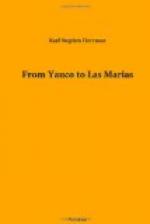The route from Yauco to Sabana Grande lies for some two miles along the level and creditable road leading to Guanica, suddenly going off at right angles just beyond a picturesque sugar-mill into as uneven, crooked, and hilly a highway as can well be imagined.
I cannot tell you in adequate language just how the tropical sun punishes the unacclimated Northerner, especially if he be a foot-soldier tramping along in a blinding dust, parched of throat, empty of belly, and loaded down with a pack that would make a quartermaster’s mule to fake the glanders. If you have been there, it needs no words of mine to galvanize your memory; and, if you have not, you cannot understand. This matter of the soldier’s pack and what to do with it became a subject of serious consideration during the recent war, in both Cuba and Puerto Rico. On the march, in the charge or pursuit or retreat, it is a senseless, clogging, spirit-shackling incubus, a rank absurdity, and an utter impossibility. As a result, after three days of active campaign the infantryman is seen gayly stalking along with no burden save his rifle, ammunition-belt, and a wisp of gray blanket, which seems to me to be a fatuous and footless condition of affairs that might well be quickly remedied for the benefit of all concerned.
[Illustration: Plaza Principal, Mayaguez. A Public Celebration of the New Flag’s Advent, under the Auspices of the Local School-teachers and their Pupils.]
As we passed the occasional little hacienda, set in its grove of cocoanut palms or orange-trees, dusky and wrinkled women came forth from the doors, bearing upon their heads huge jars, from which we filled our ever-parched canteens with cool, sweet water. They also brought us mangoes and other native fruits, and queer cigars of most abominable flavor. Because we were forbidden to eat of the fruit, we stuffed ourselves with it, and looked for more. From time to time a weary or sick soldier would lay himself down by the roadside, to be picked up later on by an ambulance; but, as the day wore on, the intervals of rest grew longer and more frequent. We had but one opportunity to water the sweating horses of the artillery, and then it was a painful matter of buckets. We munched hard-tack for our noonday meal, and made merry over it, talking of the day when we should go home and feast on beans and beefsteak and countless other things of which the heathen wot not. We were intensely voluble or silent by turns, and invented new nicknames for each other, which were so apt, spite of being touched with bitterness, that they stuck forevermore. And never, so far as I can remember, did any one mention the “Maine” or Cuba Libre.
At last, shortly after sunset, we descended a long, steep hillside, and went into camp in the valley of the Rio Grande, just without the gates of a small town, uninteresting in character, and Sabana Grande by name. We had marched only twelve miles, but were hungry, limp, and ugly. So, having crammed down a hasty supper of nothing in particular, we made short shift of absent tents, and, pulling our blankets to our chins, lay face upward to the stars that made us homesick, and slept the sleep of tired little children.




